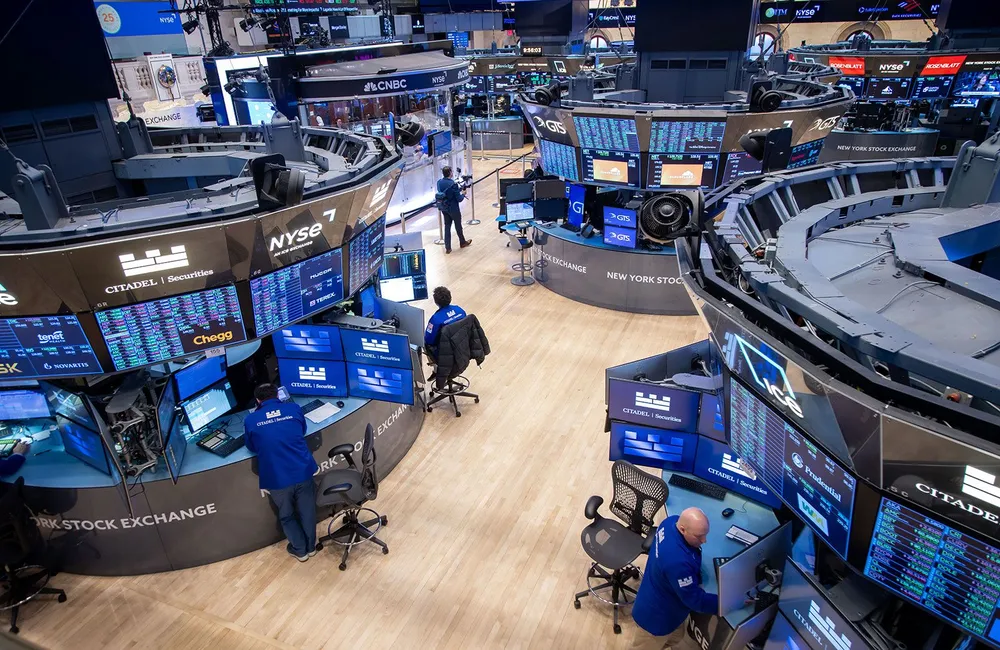ASX futures were 21 points or 0.3pc lower at 6560 at 8:00am AEDT Tuesday, indicating a drop at the open.
Stocks rose for much of the trading day overseas on Monday before taking a downward turn in the afternoon. The S&P 500 fell 0.8%. The broader index finished higher on Friday, breaking a five-day streak in the red. The blue-chip Dow Jones Industrial Average fell 0.7 percent.
The Nasdaq Composite Index fell 0.8% on declines in tech giants, including Apple, which fell 2.1%, with Bloomberg reporting the company planning to slow hiring next year. Google-owner Alphabet and Microsoft, fell 2.5% and 1%.
“That’s a lot of weight for the market to carry,” said Steve Sosnick, chief strategist at Interactive Broker. "These are market leaders. They're also pay setters at the high end of the scale.”
Australia’s S&P/ASX 200 closed up 1.2% at 6687.1 as financial, commodity and tech stocks gained at the start of the trading week.
The financial and materials sectors, which account for almost half of the ASX 200 by market value, rose 1.4% and 2.4% respectively as the benchmark index extended strong gains made on Friday following a rise in US equities.
The big four banks Commonwealth, Westpac, NAB and ANZ added between 1.0% and 1.9% and insurer Suncorp climbed 6.1% after it agreed to sell its banking business to ANZ.
Iron-ore, gold and lithium stocks were all strong, led by gains in Rio Tinto, BHP and Fortescue up between 2.1% and 3.4%. WiseTech rose 7.2% as analysts cheered the software company’s upgrade to its guidance, helping the tech sector gain 2.85%.
Commodities rose after a week-long retreat: Brent crude oil rose 4.6% to $US105.78 a barrel, gold was up 0.4% at US$1,710.20, while economic bellwether copper gained 3.5%. Iron ore was not available.
In local bond markets, yields on Australian 2 Year government bonds increased 2.62% as the 10 Year pushed upward to 3.43%. Elsewhere, the yield on 2 Year US Treasury notes ticked higher to 3.17% and 10 Year US Treasury notes to 2.99%.
And the: The Australian dollar is up 0.32% to 68.15 US cents at 7.30am AEST. The Wall Street Journal Dollar Index, which tracks the U.S. dollar against 16 other currencies, dropped to 99.42.
Asia
China stocks extended their early gains and ended the day higher, lifted by infrastructure-related shares. The Shanghai Composite Index jumped 1.6% to 3278.10, the Shenzhen Composite Index added 1.5% to 2191.96, and the ChiNext Price Index rose 1.4% to 2800.36. Sentiment had also been supported by comments from the PBOC over the weekend signaling more support for the economy, says Oanda senior market analyst Jeffrey Halley in a note. “Behind the scenes it seems an effort is on the move to try and establish a funding vehicle for struggling property developers to progress and finish the construction of residential projects,” he says. Shares of Shanghai Construction Group were 1.0% higher, while China Communications Construction rose 3.1%.
Hong Kong's blue-chip Hang Seng Index rallied 2.7% to 20846.18 following a five-day losing run. Local shares followed a rally in US markets on Monday, on relief the Federal Reserve was no longer expected to lift rates by 100 bps in July. Gains were led by shares of tech, real estate and energy companies. Country Garden advanced 6.0% and Longfor Group climbed 4.1% after China’s banking regulator announced plans to contain growing financial risks from the property sector. In the Chinese technology sector, Meituan added 5.9 percent, JD.com rose 3.1% and Tencent Holdings added 2.3%. PetroChina, Cnooc and Sinopec rose 4.3%-5.7% as crude-oil prices rose. BYD Co. was a weak spot with a 0.1% loss.
Tokyo's stock market was closed for a public holiday but shares traded in Tokyo eased off six-month highs after North Korea's latest missile test while most other Asian markets were little changed on Friday.
Europe
European markets gained after concerns over energy supplies lifted oil prices. The pan-European Stoxx Europe 600, and French CAC 40 rose by around 0.9% and the German DAX gained 0.7% as stocks in oil, mining and financials gained.
“There is the prospect of severe disruption to European natural gas flows as the primary one right now, although why Russia would play this one and leave itself high and dry in terms of influencing European governments is still very much in doubt,” writes IG analyst Chris Beauchamp.
“A better than expected set of numbers from Goldman Sachs also gave the market more good news to hang its hat on,” Beauchamp says.
London’s FTSE 100 was up 1.3 percent, lifted by mining and energy stocks as oil and metal prices rose. Top risers on the index include mining stocks Antofagasta, Glencore and Rio Tinto, energy companies Harbour Energy, Shell and BP.
Even with Monday’s rebound in London shares, there’s “a significant mountain to climb in order to unwind the losses from earlier in the year,” writes Richard Hunter, head of markets at Interactive Investor.
“And perhaps the FTSE 100 is still in with a good shot of being one of the earliest to turn the corner, currently down just over 2% year to date, though with the FTSE 250 now barely out of bear market territory following a 19% loss.”
North America
Stocks in the US edged lower at the start of the week as investors weighed earnings news from major companies and looked for clues about a series of crucial central-bank meetings.
Stocks had spent most of the session in positive territory on Monday before turning lower in the afternoon. The S&P 500 fell 0.8%. The broad index on Friday rose, ending a five-day losing streak. The blue-chip Dow Jones Industrial Average fell 0.7 percent.
The tech-heavy Nasdaq Composite Index fell 0.8% on declines at technology bellwethers, closing at 6,908.82, dragged down by a 2.1% drop in Apple Inc. shares after Bloomberg reported the iPhone maker plans to cut back on hiring next year. Owner Alphabet and Microsoft, were down 2.5% and 1%.
“That’s a lot for the market to be weighing,” said Steve Sosnick, the chief strategist at Interactive Brokers. "These are market leaders. These are also high-end-of-the-pay-scale companies.”
Big financial firms started a bumper week of earnings reports Monday. Goldman Sachs added 2.5 percent, or $7.39, to $301.26 after surpassing Wall Street’s profit estimates. Synchrony Financial rose 0.3 percent, or 9 cents, to $31.48 after reporting year-over-year declining earnings per share that were better than what analysts had expected.
Bank of America ended up 1 cent, or less than 1%, after it reported that second-quarter profits fell 32%. Shares of Charles Schwab, which posted a 42% increase in second-quarter profit, fell 94 cents, or 1.5 percent, to $61.24.
“We’ve had a couple of good surprises on earnings,” Faron Daugs, chief executive of Harrison Wallace Financial Group, said of the latest financial company earnings reports.
Investors are grappling with a bleak economic outlook against the backdrop of surprisingly strong earnings forecasts. The economy is beginning to show signs of slowing down as inflation soars, reaching a four-decade high. Meanwhile, the central banks are busy raising interest rates quickly, throwing yet another black cloud on the economy’s horizon.” It’s early on, but corporate reports have been underwhelming.
“The economic story is wrong or analysts are too optimistic on earnings, and it feels like the latter,” said Altaf Kassam, head of investment strategy for Europe, the Middle East and Africa at State Street Global Advisors. “If you scrape the text of company earnings announcements, a lot of companies are whining.
Other companies expected to report this week include Johnson & Johnson on Tuesday, Tesla on Wednesday and Twitter on Friday.
“We think growth is bottoming here, and that would be mostly technology here, but even broader than that,” said Ivana Delevska, founder and chief executive of the investment firm SPEAR Invest, which is concentrated in industrial technology companies.
New figures from the National Association of Home Builders indicated that its index of confidence among US home builders fell by 12 points to 55 in July. Economists polled by The Wall Street Journal had anticipated a seventh straight monthly decrease, but also a higher reading.
In the bond markets, the yield on the 10-year United States Treasury note increased to 2.959 percent, from 2.929 percent on Friday. Bond yields and prices move in opposite directions.
The European Central Bank is likely to lift rates for the first time in 11 years at a meeting on Thursday. The region’s economy is more strongly affected by the war in Ukraine and an energy crisis than other economies. The Bank of Japan will likely defy its global central bank peers and leave rates unchanged on Thursday.
The Federal Reserve has indicated that it will increase interest rates by three-quarters of a percentage point for the second consecutive time later this month.
“I don’t think this volatility is going to end until the Fed at least gets its foot off the brake,” said Mr. Sosnick, of Interactive Brokers.





















